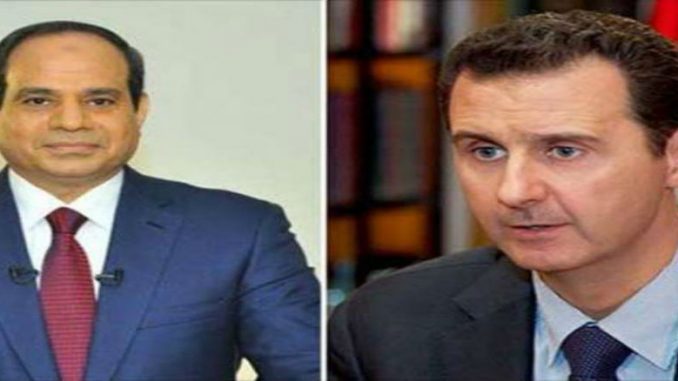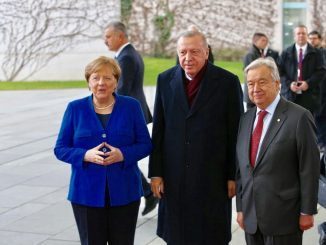
Russia’s Foreign Minister has stated that Egypt could take part in peace talks between the Syrian regime and rebels next month in Kazakhstan being organized by Moscow, Ankara, and Tehran. Sergey Lavrov said that Russian President Vladimir Putin and his Egyptian counterpart Abdel Fattah al-Sisi discussed in a phone call the possibility of Egypt joining the peace talks.
According to a Russian state media, Lavrov said, “Given the importance of expanding the number of guarantor states, we consider inviting our Egyptian counterparts to join these agreements.”
He added, “In the future, at some other stages, perhaps, we need to attract some other key players, which have an impact on developments in Syria. These are Saudi Arabia, Qatar, Iraq, and Jordan.”
However, Iran’s defense minister said last week that Saudi Arabia should be excluded from the Syrian peace process.
Earlier reports have also highlighted a possible Egyptian role in Syria’s future.
The reports said that the Egyptian government will soon send peacekeeping troops to Syria to help administer a nationwide ceasefire.
According to al-Masdar News, a pro-regime news site, Egyptian forces would be sent in “the coming days” to aid in stopping the bloodshed.
It seems that Egypt is getting more involved in the Syrian issue amid Cairo’s rapprochement towards the Russian axis.
Last November, some media reports revealed that al-Sisi has sent military troops to support al-Assad’s regime.
Al-Safir, a Lebanese newspaper close to the Shiite militant group Hezbollah, revealed that an Egyptian unit that includes 18 Egyptian pilots has started to work at Hamah military airbase in Syria since November 22.
18 pilots were part of a special helicopter squadron operating at Hamah airbase and have been at the base since 12 November, according to the same source.
It is not known if the pilots have already participated in airstrikes or not, but their presence at Hamah airbase shows that there is an Egyptian-Syrian decision to speed up merging the Egyptian pilots.
The first group of 4 high-ranking Egyptian officers from the Egyptian General Staff entered Syria and were deployed in the Syrian army’s general staff base in Damascus, adding that two Egyptian Major Generals started work in the Syrian army’s operations room a month ago, and their responsibility is leading reconnaissance operations, the latest of which was in Quneitra in Southern Syria, the Golan Heights and Daraa.
Arab sources were quoted saying that Cairo is also studying dispatching its ‘Thunder Forces’ to Syria to help the army more extensively in operations.
It also quoted senior Syrian security sources as saying that the Egyptians have promised Damascus to send their forces to Syria and will start massive participation in battles there on January 23, adding that Cairo’s military presence will go beyond its role in Hama airbase.
On the other hand, Sameh Shoukry, Egypt’s foreign ministry, later dismissed the report as “imaginary”.
Last October, a top Syrian intelligence official discussed security coordination with his Egyptian counterpart amid warming ties between the two countries.
Syria’s state news agency SANA reported then that Syrian National Security Bureau chief Ali Mamlouk “made an official visit to Cairo,” where he met with General Khaled Fawzy, the head of Egypt’s General Intelligence Service, as well as other “senior security officials.”
SANA said “The two sides agreed to coordinate political stances,” adding that they also decided to “strengthen coordination in the fight against terrorism.”
In August 2015 Mamlouk, who has served as a diplomatic troubleshooter for the Bashar al-Assad regime, previously traveled to Egypt in August 2015.
Al-Mamlouk was appointed chief of the Syrian National Security Bureau in 2012. He currently supervises all Syrian security apparatuses. Al-Mamlouk’s name is one of several Syrian names listed by imposed E.U. sanctions.
In the same context, Al-Masdar News (AMN), had reported that a group of officers from the Egyptian Army traveled to the port-city of Tartous, Syria to train with Russia’s military advisors near the Islamic State’s front-lines.
Al-Masdar News had claimed it quoted some local activists saying that the Egyptian officers were accompanied by Russian military personnel upon their arrival to Tartous.
In the same context, al-Sisi also expressed his support for the Bashar al-Assad’s military forces in its war against “terrorists” last November, a position at odds with his country’s Gulf benefactors especially Saudi Arabia.
In response, al-Assad welcomed Abdel Fattah al-Sisi’s statements on supporting his army last December in an interview with al-Watan, a Syrian newspaper, saying, “We hope that al-Sisi’s statements would be reflected on improving the relations between both countries.”
The Egyptian-Saudi relations have soared as a result of Egypt’s vote in favor of a Russian-backed draft resolution in the UN Security Council on Syria, which was opposed by Saudi Arabia.
As a result, Egypt’s stance has angered Egypt’s major Gulf backer which condemned Egypt’s vote and described it as a “painful” stance.
After the voting, the Saudi ambassador to the UN, Abdullah al-Mouallimi said, “It was painful that the Senegalese and Malaysian stance was closer to the Arab’s consensus than the Egyptian delegation.”
He also said that he feels pity for these countries that voted for the Russian resolution, stressing that his country will continue backing the Syrian people by all means.
Two days following the voting, Saudi state-owned oil company Aramco announced halting oil product supply to Egypt. The sudden halt, triggered a scornful media campaign against Saudi Arabia, as it was seen as a political decision. On the other side, Saudi journalists and media men criticized the Egyptian regime and blamed the kingdom or its financial generosity to the al-Sisi regime.



